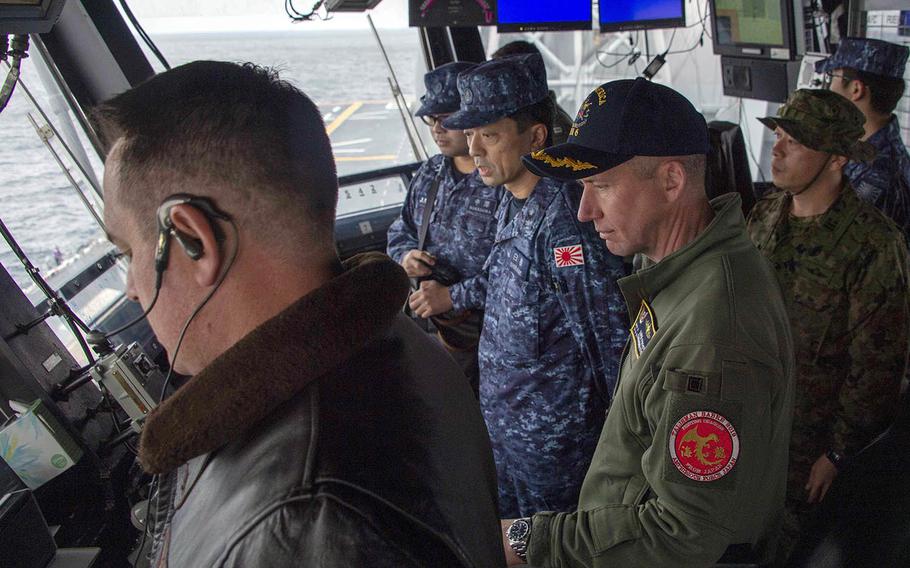
Capt. Luke Frost, commander of the USS America, and Japanese Rear Adm. Shirane Tsutomu watch flight operations aboard the amphibious assault ship in the East China Sea, Jan. 13, 2020. (Vance Hand/U.S. Navy)
A new Rand Corp. report released Thursday found that the Japan Self-Defense Forces could offer “effective and capable” assistance to the United States should a conflict erupt with China in the East China Sea.
Japan’s Constitution restricts its military operations to defensive initiatives only, and its laws may hinder its efforts, according to the report.
Still, Japan’s strengths position it “to make things very difficult for China to prevail quickly in conflict,” according to the think tank report.
“Much relies on Japan’s political decisionmakers, who, in a time of a crisis, will be challenged to ensure that their decision-making timelines are fully in sync with U.S. operational needs,” the report said.
Japanese strengths include advanced weaponry, a greater presence in the Ryukyu Islands southwest of the main islands of Japan, and capabilities in minesweeping and anti-submarine warfare.
The report, "Japan's Potential Contributions in an East China Sea Contingency," called the U.S. alliance with Japan “arguably its most important in pursuit of objectives” outlined in the National Defense Strategy.
That strategy, written in 2018 by then-Defense Secretary Jim Mattis, formally shifted U.S. defense priorities to the Indo-Pacific region and strategic competition with China.
Since then, the military has boosted its presence in the South and East China seas, which Beijing views as its territory. The U.S. considers those regions to be international waters, and the Navy and Air Force frequently carry out freedom-of-navigation operations there, sailing through and flying over waters that China claims as its own.
In the East China Sea, China and Taiwan dispute sovereignty of the Japanese-controlled Senkaku Islands northeast of Taiwan. The Trump and Obama administrations have said an attack on the Senkakus would invoke the U.S.-Japan Treaty of Mutual Cooperation and Security, meaning the U.S. military would be obligated to respond.
Tokyo has accused Beijing of using coercive means to negate Japan’s control of the islands. On Nov. 3, China broke a record for the number of days per year that its vessels are spotted near the disputed islands. Its ships spent 284 days there this year, two more than the record 282 set in 2019, according to the Japan Coast Guard.
The Rand report comes after the defense ministers of Japan and China in a video call Monday reaffirmed their countries’ opposing claims to the islands, which the Chinese call Diaoyu Dau.
Tensions over the Senkakus have inspired the Japan Self-Defense Forces to alter their training and resources to better prepare for a potential conflict in the region, according to the report.
“Over the past decade, as provocations by China in the East China Sea have increased, the [Japan Ground Self-Defense Force] has reoriented itself to be more mobile and realigned its capabilities to respond to events in Japan’s southwest,” the report said. “This has meant taking on anti-air and anti-ship functions and developing amphibious capabilities.”
These capabilities alone, according to the report, may not be enough to stave off an attack by the Chinese but could offer substantial assistance to the U.S. to defend Japan against China in a conflict.
The capabilities “increasingly keep Chinese forces at length with a growing suite of (anti-access/area denial) capabilities thereby heightening the risk to China in any East China Sea contingency and allowing Japan to remain in the fight in support of the United States,” according to the report.
For this reason, the U.S. military can expect to continue receiving Tokyo’s support, according to the report.
“While Japanese laws set limits for all of these, the United States can expect Japanese domestic laws and interpretations to support U.S. operations,” the report said.